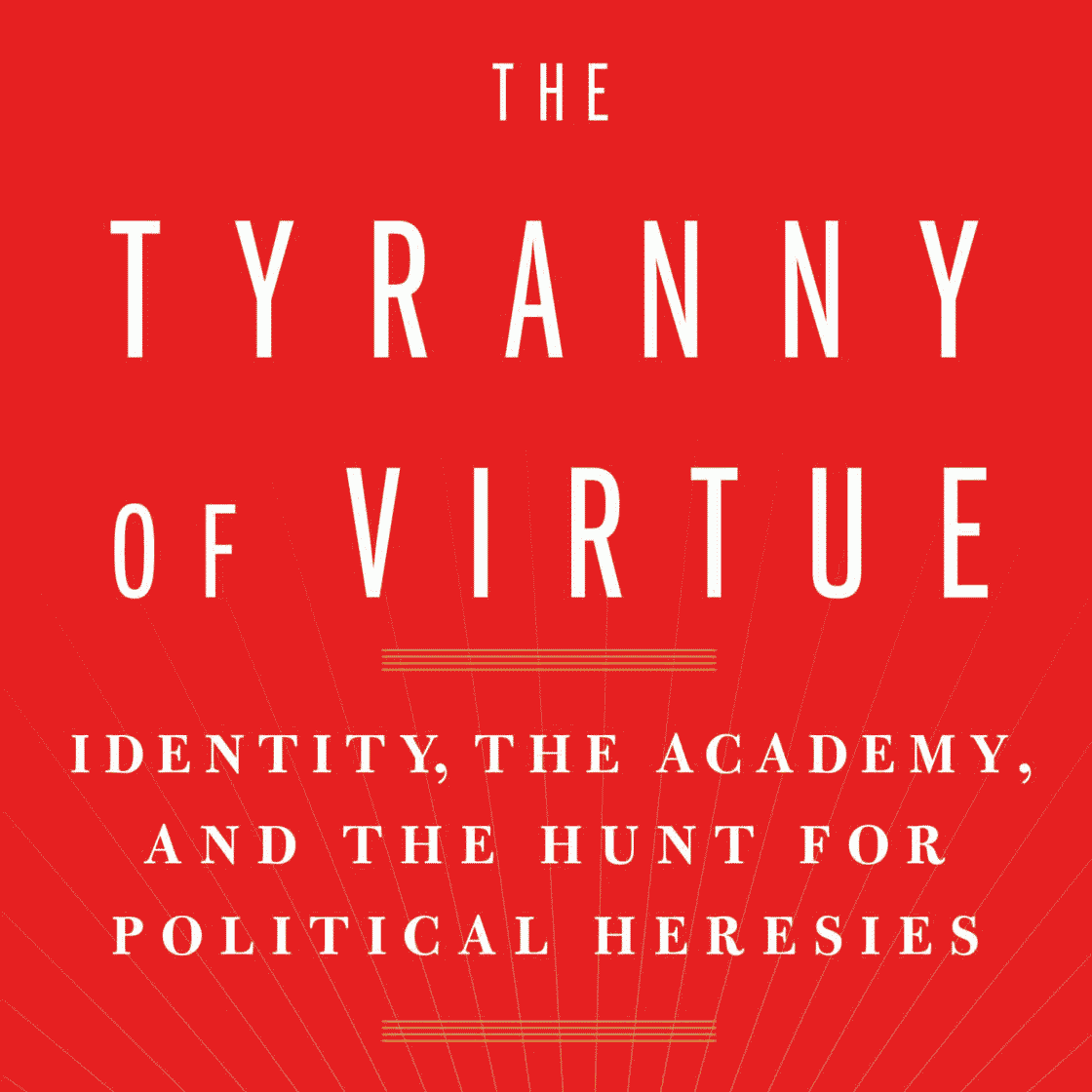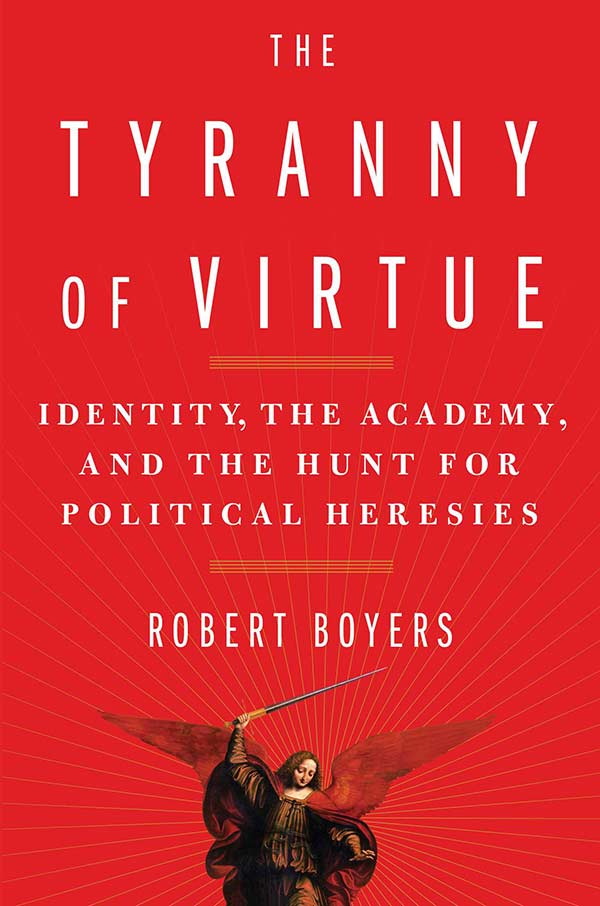A regime-imposed ideology, tolerating no dissent, enforced by a surveillance state and thought police, with transgressors punished. Welcome to Nineteen Eighty-Four. China? Yes. But increasingly such illiberalism has infiltrated America’s “liberal” universities. If nothing else, surely liberalism means promoting human liberty, with freedom of thought and expression essential. Yet over the past decade college campuses have seen the rise of speech codes, speakers disinvited or shouted down, professors offending against the approved catechism forced to apologize, submit to re-education, or even to resign. And an obsession with “diversity” while suppressing the kind that should matter most—diversity of viewpoint.
Documenting these disturbing trends is Robert Boyers, who has taught in academia for half a century, currently at Skidmore. He’s the longtime editor of Salmagundi, Skidmore’s quarterly magazine of politics, culture, literature and the arts, and he is very much a man of the left. His 2019 book, The Tyranny of Virtue: Identity, The Academy, and the Hunt for Political Heresies, calls out the perversion of liberal ideals he sees in American universities—political correctness metastasizing into a rigid party line that brooks no dissent, while plunging down rabbit holes of absurdism. The book is full of horror stories from the author’s own experience. Contradictions and ironies abound. The reader enters a hall of mirrors.
The book’s main theme is dismay at the suppression of argument, with key issues deemed settled beyond dispute, no discussion allowed. How to justify this? Postmodernism promoted the idea that argument itself is suspect because nothing is really true and reason cannot surmount that. Hence a refusal to countenance debate. And while postmodernism encouraged a fetish for nonjudgmentalism, in academia this strangely transmogrified into a judgmentalism of the harshest sort—against any deviation from the canonical ideology.
Boyers relates a cautionary tale of how his own younger self once swallowed an apologia by Herbert Marcuse that freedom of speech must yield to an enlightened minority whose virtue entitles it to suppress divergent views deemed harmful. Fortunately, Boyers himself ultimately gagged on this bilge. Unfortunately, such intellectual arrogance is at the heart of today’s academic culture.
If the PC catechism is really as manifestly correct as its woke minions seem to think, then how is it threatened by debate? Maybe they fear they’ve built a house of cards that cannot withstand scrutiny, so scrutiny is barred.
Some European countries limit free expression, disallowing ideas deemed offensive in the name of banning “hate speech.” Holocaust denier David Irving, for example, was jailed in Austria for going there to give a speech. (Michael Shermer, as recounted in his book Giving the Devil His Due, wrote the judge on Irving’s behalf, despite disagreeing with nearly everything Irving spouts.) America’s First Amendment culture clearly differs, with freedom of speech trumping any sensitivities of hearers. After all, almost anything is bound to offend someone. Jefferson said the answer to bad ideas is not suppression, but better ideas. But our universities have veered away from that ethos, elevating protection against being offended, or even just being made “uncomfortable,” above freedom of expression.
Looming large in today’s PC catechism is the concept of “privilege,” not just “white privilege”—although that takes precedence—but any sort of power or status. Anyone deemed to be speaking from a standpoint of “privilege” is delegitimized and to be silenced. But aren’t the attackers themselves invoking a privilege of their own—polemical, ideological privilege? The privilege of feeling virtuous by finding others guilty of existing in an evil “privileged” status?
Another key concept is “inclusiveness.” Applicable to previously marginalized identities like non-whites, gays, women, etc., it includes people who’ve sometimes been seen as “the other.” Yet aren’t those tarred with the “privilege” label being likewise marginalized, themselves “the other” now? Further, the inclusivity mandate means that anything possibly construed as condescending toward some now-coddled group is an unpardonable sin. But isn’t the shielding of such groups, in a way that implies their inability to endure even the subtlest affront, not itself highly condescending?
For all the prattling about “inclusivity,” the related notion of identity, as fetishized in the academy, is fundamentally a concept of us vis-a-vis them, if not indeed us versus them. Rather than liberating us to live out self-actualized identities, people are defined by identities that are circumscribed by the prevailing ideology. Boyers writes that the “rage for ‘identity’ too often bespeaks a preference for simplicity rather than for complexity.” A trans person is not really even allowed to be anyone beyond trans, for to stray outside that box is treasonous. No Whitmanesque containing of multitudes!
Race, of course, figures large. Boyers grapples with what racial identity entails, quoting James Baldwin about his fraught relationship with European cultural icons like Shakespeare, Rembrandt, and Bach, in the context of his African heritage. I couldn’t help thinking that I have no comparable issues, my own Jewish ancestry feeling relatively immaterial to who I am as a human being. Shakespeare, Rembrandt, and Bach are part of our common human heritage, as is the experience of Africans who were enslaved. I do not discriminate in my relating to them all, as my race is the human race. That statement itself might be labeled “racist” in woke culture.
I’ve been seeing a lot of polemics lately about “whiteness” that seems incoherent, like white people should somehow get over, or move beyond their whiteness, whatever that means. As Boyers notes, “whiteness studies” has now become an academic subject domain, with those harping on “white privilege” stereotyping all whites as a monolithic block. There’s a word aptly describing this stance toward whites: racist.
Then there are “micro-aggressions,” referring to anything that makes anyone uncomfortable, with the “micro” modifier being a misnomer inasmuch as in this realm no transgression is ever beneath notice. And anyone accused of a micro-aggression becomes a target of aggression that isn’t “micro” at all. Perpetrators of such putative offenses are said to create a “toxic environment.” But what’s truly toxic about the environment in today’s academy is a climate of fear lest one blurt out anything crossing the innumerable PC red lines, becoming subject to sanction.
Disability is another minefield for anyone hoping to actually stay safe on campus. Boyers describes a poster incongruously headed KEEP SKIDMORE SAFE, with a catalog of “ableist” language to be avoided on pain of disciplinary action, such as employing such everyday idioms like “turn a blind eye,” or “run to catch a train.” So plainly ridiculous are such examples that one might have thought this a parody satirizing the whole offense-taking culture. But no, it was in earnest. Boyers deems it “hard to imagine a better example of a hostile work environment,” putting everyone in fear of the thought police.
Then there is the absurd notion of “cultural appropriation,” barring white artists and writers from dealing with anything involving minority cultures. For example, a painting based on the famous Emmett Till funeral photo, by a white artist, met with demands that it be removed from the Whitney Museum—indeed, that it be destroyed. “Stay in your lane,” voiced one critic. That the painting’s intent was supportive of blacks was of no account. Boyers says there’s no distinction being made between predation and homage, and a “stay in your lane” norm would limit every writer to memoir only.
Throughout the book Boyers deploys metaphors from religion, such as the saved versus the damned, with the “woke” creed becoming a church united by a zeal to persecute heretics. So deranged with self-righteousness, the progressive congregation cannot see the contradictions, the chasms between its preachings and practices. Boyers notes that over 200 U.S. universities now have “bias response teams” that, together with campus police, investigate the speech of professors and students for micro-aggression infractions. The University of California system circulated a list of such prohibited locutions, including “America is a land of opportunity” or “you speak English very well.”
Boyers writes that “self-described liberal academics continue to believe that they remain committed to difference and debate, even as they countenance a full-scale assault on diversity of outlook and opinion, enwombed as they are in the certainties enjoined on them by the posture they have adopted, which alone confers on them the sense that they are always in the right.” Thus, our universities now exist not to broaden minds but to confine them within the narrow bounds of a prevailing orthodoxy. They’ve become re-education camps.
Looking forward, in an author talk, Boyers avowed guarded optimism that we may have reached peak PC, with sanity starting to push back (see, for example, the influential Heterodox Academy with its thousands of professorial members who do not sign on to the PC woke culture). It’s also worth noting that the craziness Boyers calls out in academia has not, to any great extent, yet infected the broader American culture. But it could, as universities continue pumping out more ideological zealots; so freedom still needs defending as much as in Jefferson’s time.
About the Author
Frank S. Robinson is a retired New York administrative law judge, and professional numismatist. He is the author of several books, including The Case for Rational Optimism (2009). He is married to the poet Therese Broderick and blogs at rationaloptimist.wordpress.com.
This article was published on May 5, 2020.

















I agree with Mr. Robinson, who agrees with Mr. Boyer: rather than create a better mousetrap, PC, or “woke” tries to destroy anyone else’s. Mr. Robinson is especially insightful in not equating his Jewishness with James Baldwin’s blackness: “I couldn’t help thinking that I have no comparable issues, my own Jewish ancestry feeling relatively immaterial to who I am as a human being. ” Correct: One can choose one’s degree of Jewishness; One cannot choose one’s degree of Blackness.
Mr. Robinson writes, “…my race is the human race.” Unfortunately, for many “illiberals”, the human race excludes those not them